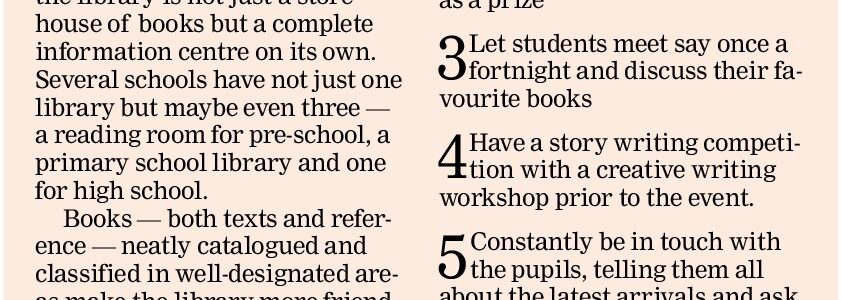Libraries today have become bustling information centers
Most adults today would remember their school library as a place they went to, once a week for the “Library period”. Some eagerly waited for this period while others pretended to choose a book, issued it in their name, kept the book for over a week and returned it without reading. Most often it was a room somewhere secluded far away from the hustle and bustle of the school — a seemingly mysterious place that housed more mysteries than the Enid Blyton books it housed.
What a far cry from the present day library! Today the library in most progressive schools is a thriving ‘organism’ by itself. Well-lit, large and airy, the library is not just a storehouse of books but a complete information centre on its own. Several schools have not just one library but maybe even three — a reading room for pre-school, a primary school library and one for high school. Even if it is restricted to just one, it is a repository of information.
Books — both texts and reference — neatly catalogued and classified in well-designated areas make the library more friendly and accessible. Books according to the choice of the reader and within the budget of the school are available in more than one copy. Fiction books are arranged class-wise with a separate rack reserved for the staff. I have always loved libraries, and even today try and visit it at least once a day. The latest arrivals too are prominently placed so as to catch the visitors’ attention.
Libraries today have become bustling information centers. What with Wi-Fi availability one wonders whether it is a school library. But, I must state that more than the books that are read, the young student makes a beeline for the technology centre and accesses his reading material online. Yes, there are students who read the actual book, but the rest prefer the Kindle. I guess we need to accept the winds of change; we are after all catering to a generation that will throng the adult world maybe ten years from. Who knows what sort of a world that will be!
But to get back to the library, librarians are doing their best to attract young readers and develop in them a love for reading. Some strategies are:
- Organising book fairs and exhibitions.
- Meet the author: Invite authors to come and read out excerpts from their books. Maybe even autograph their books. This is a win-win for both parties.
- Have book review contests and give away the latest book as a prize.
- Allow students to borrow books during vacations and permit them to be renewed online during vacations. (If the librarian and school authorities think that the borrower is responsible enough).
- Have book clubs: Let students meet say once a fortnight and discuss their favourite books. Follow this up with a book reading session.
- Have a story writing competition with a creative writing workshop prior to the event.
- Constantly be in touch with the pupils, telling them all about the latest arrivals and ask them for feedback. Ask them if there is any special author or title that they are interested in.
- Have multiple copies of popular books. Create smaller class libraries if you can.
- Get parents involved. Permit them to use the library if they wish. This will create a sense of belonging and partnership.
- Have a Read Together Session: Let the child and the parent read a book together. This will help in strengthening their bonds.
- Organise Treasure Hunts using book titles as clues. Have a quiz, What’s the Good word, Dictionary and Pictionary Challenge, and so on.
The list is endless.
With time being at short supply, create a library website so that teachers, students and parents realise that the library and its librarian are truly ‘happening’ and not the musty drab and dull place they mistakenly think it to be.
A word of caution or advice or whatever you will to the Librarians – “you are the keeper of the keys of the cupboard ” as it were, of the pupils reading treasure. Please unlock this world of magic and excitement to your students; if being a librarian is just a job to you, you may just as well not do it.
Author: Dr. Ranjini Krishnaswamy
Email: jinikay@gmail.com
This Article was published in the DNA Newspaper (Mumbai Edition) on 8th May 2017. You can read it here.





